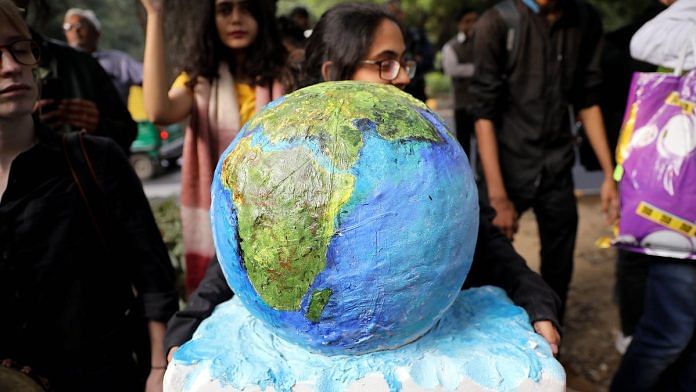New Delhi: Climate finance is expected to take centrestage at the 29th edition of the Conference of the Parties (COP29), which will be held at Azerbaijan in November this year. But negotiations between wealthier nations and emerging economies are already playing out.
The recent discussions at the Ad Hoc Work Programme (AHWP) of the United Nations Framework Convention on Climate Change (UNFCCC) saw differences emerge over who should contribute to the new quantified goal on climate finance, and the amount itself.
At the AHWP discussions held in Cartagena, Colombia, between 23 and 26 April the US said that the New Collective Quantified Goal (NCQG) is “voluntary” for those who “choose to pay”. This was said referring to Article 9.3 of the 2015 Paris Agreement, which details climate finance.
Also read: Climate change doesn’t just affect poor people, farmers. Cities and banks aren’t safe either
What is climate finance
Climate finance is defined as local, national or transnational financing, which seeks to support mitigation and adaptation actions to address climate change. The Paris Agreement calls for financial assistance from countries with more financial resources to the underdeveloped and developing nations that are more vulnerable.
“This recognises that the contribution of countries to climate change, their capacity to prevent it and cope with its consequences vary enormously,” reads a UNFCCC document. It goes on to explain that climate finance is needed for mitigation, because large-scale investments are required to significantly reduce emissions. It is equally important for adaptation because significant financial resources are needed to adapt to the adverse effects and reduce the impact of a changing climate.
India’s stand
One of the main agendas to be discussed at the upcoming COP meetings is to negotiate a new goal for the NCQG.
The NCQG currently has a baseline of USD 100 billion every year after 2025 to help developing countries meet their low-carbon goals.
According to the Third World Network, an independent not-for-profit tracking the Cartagena meeting, India, which represented like-minded developing countries, vehemently disagrees with the US’s interpretation.
India stressed that future goals need to be set in accordance with the Paris Agreement, which mentions equitable growth for all countries. This, Indian negotiators said at the AWHP, can only be achieved if developed nations take on greater responsibility towards a common goal.
According to the principle of “common but differentiated responsibility and respective capabilities”, developed countries or parties are to provide financial resources to assist developing countries in implementing objectives that have been set by UNFCCC.
“Developed country parties should also continue to take the lead in mobilising climate finance from a wide variety of sources, instruments and channels, noting the significant role of public funds, through a variety of actions, including supporting country-driven strategies, and taking into account the needs and priorities of developing country parties,” the UNFCCC said.
“Such mobilization of climate finance should represent a progression beyond previous efforts,” it added.
‘Developed nations don’t want to sign a blank cheque’
Experts believe that these disagreements could blow up and become a bone of contention between developed and developing nations in the Baku negotiations in Azerbaijan, where COP29 will be hosted this year.
Speaking to ThePrint, Vaibhav Chaturvedi, Fellow, Council on Energy, Environment and Water (CEEW), said that these discussions are “not surprising” and are concerns that both sides have been flagging for the last two COP discussions.
“The point to note here is that the developed nations have been stressing on making NCQG voluntary and not mandatory as they do not want to sign a blank cheque. While it is unsaid, a commitment to NCQG is an unconditional commitment, kind of like a bottomless pit, given potential demands for supporting adaptation and loss and damage in the future,” said Chaturvedi.
Developing nations, like India on the other hand, do not want to let NCQG go because the need for adaptation and loss and damage will only increase in the coming years and they hold the developed nations historically accountable for the same, he said, adding that both blocs will have to find a middle ground.
“I think in the next COP, the focus will be on NCQG, and we will likely get a number (on how much developed countries would be required to pay). But it will most likely be accepted with certain caveats — to make payments voluntary and not mandatory, and to reconsider the definition of ‘developing nations’,” he added.
Developed vs developing
During the Cartagena meeting, developed countries were of the view that the contributor base needs to be reevaluated on the basis of the evolving capabilities of countries with the capacity to pay, the GDP of countries and its emission load. The point of which countries will receive the money was also raised during discussions. Another point raised by the US during discussions, which met with strong counter from developing nations, was the review of mitigation targets of recipient nations. This was also raised during the Sharm-el-Sheikh climate talks of 2022.
The US stressed that countries receiving financial aid should be bound by regular reviews of their climate action targets. India, in the recent discussions at Cartagena, disagreed with these demands. Indian negotiators reiterated that it “made no sense” for the NCQG to be outcome based. India argued that the only outcome that can be quantified and evaluated is whether the quantum committed by the developed countries was in line with the requirements of the developing nations.
“The NCQG should provide a clear agreement about burden sharing among developed countries to establish a fair share of their collective obligation to provide climate finance, which provides predictability, transparency and accountability,” India said.
Leading up to COP29, such discussions will be carried out with domain experts, civil society groups and representatives from nations to build on the final goal.
Also read: India’s climate leadership test will come after COP28. Here’s how it can step up



